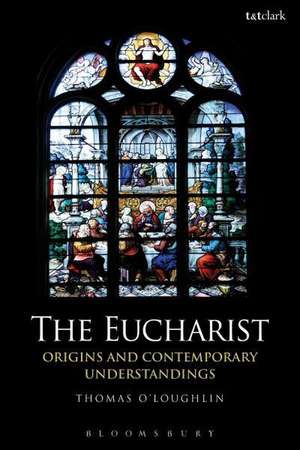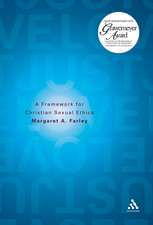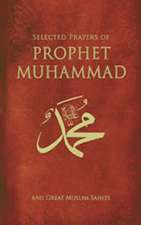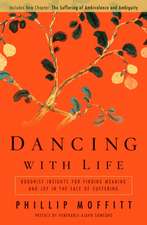The Eucharist: Origins and Contemporary Understandings
Autor Thomas O'Loughlinen Limba Engleză Paperback – 28 ian 2015
| Toate formatele și edițiile | Preț | Express |
|---|---|---|
| Paperback (1) | 218.91 lei 6-8 săpt. | |
| Bloomsbury Publishing – 28 ian 2015 | 218.91 lei 6-8 săpt. | |
| Hardback (1) | 773.88 lei 6-8 săpt. | |
| Bloomsbury Publishing – 28 ian 2015 | 773.88 lei 6-8 săpt. |
Preț: 218.91 lei
Preț vechi: 246.03 lei
-11% Nou
Puncte Express: 328
Preț estimativ în valută:
41.89€ • 45.49$ • 35.19£
41.89€ • 45.49$ • 35.19£
Carte tipărită la comandă
Livrare economică 22 aprilie-06 mai
Preluare comenzi: 021 569.72.76
Specificații
ISBN-13: 9780567384591
ISBN-10: 0567384594
Pagini: 248
Dimensiuni: 156 x 234 x 18 mm
Greutate: 0.41 kg
Editura: Bloomsbury Publishing
Colecția T&T Clark
Locul publicării:London, United Kingdom
ISBN-10: 0567384594
Pagini: 248
Dimensiuni: 156 x 234 x 18 mm
Greutate: 0.41 kg
Editura: Bloomsbury Publishing
Colecția T&T Clark
Locul publicării:London, United Kingdom
Caracteristici
Helps
overcome
current
divisions
by
going
back
to
tradition
and
bypassing
later
controversies
Notă biografică
Thomas
O'Loughlinis
professor
of
historical
theology
in
the
University
of
Nottingham,
UK.
His
research
has
focused
on
the
theology
of
the
early
medieval
period,
and
on
the
works
of
insular
writers
in
particular.
Cuprins
Table
of
ContentsPrefaceIntroduction1.
Starting
points
for
a
study
of
the
Eucharist2.
The
focus
of
eucharistic
thinking:
thanking
the
Father3.
Locating
our
ritual:
food,
community,
and
prayer4.
Locating
the
Eucharist5.
Meals
and
Christian
Memories6.
Distinctive
memories:
the
acts
of
blessing
and
their
recollection7.
The
Common
Meal
and
the
Common
GoodAbbreviationsBibliographyIndex
Recenzii
[E]xcellent,
well-written
and
eminently
readable
...
I
recommend
this
book
highly.
Though the presence of Christ has been central to Eucharistic theology, Thomas O'Loughlin (The Eucharist) argues that in Tridentine Catholicism 'the dominant thinking about the event of physical engagement with the Eucharist was imagined in terms of a sacred commodity. The priest 'confected' the Eucharist, it was reserved for adoration and the wick, it was received when someone chose to receive Holy Community, and one could 'get communion' 'outside of Mass''(36).
In this thought-provoking book, O'Loughlin challenges us to re-calibrate our inherited presuppositions about the Eucharist so that we prioritise it first and foremost as a meal among Jesus' friends at which thanks is given to the Father. This, he suggests, will correct the theological and ritual impasse in which the churches find themselves and will be closer to the intentions expressed in the earliest evidence for Christian Eucharistic practice. As usual, O'Loughlin argues his case with a freshness and mastery of the sources which will encourage thoughtful reflection by scholars and church people alike.
O'Loughlin's ability to juxtapose elements harvested from his wide-ranging knowledge and to reflect profoundly on their implications for the understanding and practice of the Eucharist today means that virtually every page of this work is deeply thought-provoking, even in those places where a reader might disagree with him.
O'Loughlin's provocative reflections on the meaning of Christ's presence, the notion of consecration vis-à-vis the whole eucharistic prayer and the role of the priest are important questions that need to be rethought today. I stand in awe of the depth and breadth of his reading and research.anyone who wishes to be challenged to rethink time-worn theological statements on this most important aspect of Christian life should not miss one.
Though the presence of Christ has been central to Eucharistic theology, Thomas O'Loughlin (The Eucharist) argues that in Tridentine Catholicism 'the dominant thinking about the event of physical engagement with the Eucharist was imagined in terms of a sacred commodity. The priest 'confected' the Eucharist, it was reserved for adoration and the wick, it was received when someone chose to receive Holy Community, and one could 'get communion' 'outside of Mass''(36).
In this thought-provoking book, O'Loughlin challenges us to re-calibrate our inherited presuppositions about the Eucharist so that we prioritise it first and foremost as a meal among Jesus' friends at which thanks is given to the Father. This, he suggests, will correct the theological and ritual impasse in which the churches find themselves and will be closer to the intentions expressed in the earliest evidence for Christian Eucharistic practice. As usual, O'Loughlin argues his case with a freshness and mastery of the sources which will encourage thoughtful reflection by scholars and church people alike.
O'Loughlin's ability to juxtapose elements harvested from his wide-ranging knowledge and to reflect profoundly on their implications for the understanding and practice of the Eucharist today means that virtually every page of this work is deeply thought-provoking, even in those places where a reader might disagree with him.
O'Loughlin's provocative reflections on the meaning of Christ's presence, the notion of consecration vis-à-vis the whole eucharistic prayer and the role of the priest are important questions that need to be rethought today. I stand in awe of the depth and breadth of his reading and research.anyone who wishes to be challenged to rethink time-worn theological statements on this most important aspect of Christian life should not miss one.












